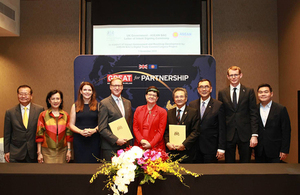Madam President, the United Kingdom attaches great value to the role of the African Union in preventing and mediating and resolving conflicts on the African continent. And this is an important element not only of our collective work of the Security Council, but also of the United Kingdom’s own bilateral strategic partnership with the African Union. We are proud to provide national support for African Union priorities in this area, including the Continental Early Warning System, electoral observation missions, peace support doctrine development and pre-deployment training for African troops and police contributing countries. And we very much commend the determination of United Nations Secretary-General and Chairperson of the African Union to reinforce the partnership between the UN and the AU on peace and security. And let me pay tribute, personally and specifically, to the valuable work of the UN office to the AU under the leadership of SRSG Tetteh, and of course, her counterpart here at the United Nations, Permanent Observer Fatima Mohammed, who both, I think, do excellent work for their organisations.
Madam President, the United Nations-African Union Partnership in Peacekeeping and in Peace Support Operations continues to develop. The United Kingdom supports, in principle, access to UN assessed contributions for future AU-led peace support operations on a case by case basis and subject to certain key conditions. A key consideration in any future council decision on this issue is the African Union’s own commitment to fund 25 percent of the costs of its own peace support operations. This is an important symbol of African determination to take ownership of African-led solutions to conflict on the continent. Robust financial reporting arrangements, clear joint planning and coordination structures and strong compliance frameworks for human rights compliance, international humanitarian law and conduct and discipline will also be key. And may I at this point express my disappointment to find that posts dealing with just these issues in the UNSOM discussions this year were not supported by members of the Africa group in the Fifth Committee. So we encourage the Secretariat and the African Union Commission to continue their work on these important technical areas.
Madam President, at the Niamey meeting of the 8th of July, Member States agreed that detailed proposals for effective division of labour between the AU and African subregional organisations would be developed. We very much welcome this. An enhanced partnership between the United Nations, the African Union and subregional organisations will be crucial in supporting progress on issues such as continued implementation of the South Sudan Peace Agreement – and let me here echo the words of my colleagues about our visit to Juba this month under the leadership of the South African President of the Council and, of course, our American colleagues. I think we left Juba with a clear agreement that we needed to stick to the 12th of November timeline; that all parties needed to compromise for the good of the people of South Sudan; that the United Nations – and I think the African Union with it – the Security Council expressed their commitment to being part and to monitoring the implementation of any outstanding tasks after a transitional government were formed; and, of course, our determination to take action against spoilers. Let me also say how important that partnership was in Sudan’s transition to civilian governance – and the African Union was strongly supported by this Council through the events of this summer – and, of course, for a sustainable political settlement in Somalia.
On Libya, I would welcome very much an increased African Union role on Libya, as we discussed when we were in Addis. And it’s extremely important, as our German colleague has pointed out, that the African Union is fully represented as part of a key part of the Berlin process. But I would also just highlight the key role that other regional organisations play, including, of course, the League of Arab States – and I’ve no doubt the Kuwaiti ambassador will be mentioning that – and the European Union for that matter.
Madam President, closer coordination between the United Nations, African Union and subregional organisations should also support earlier and more effective action to prevent slow burning political crises developing into conflicts, with each leveraging their comparartive advantage. And I think this is entirely consistent with the summit with the African Union’s initiative to silence the guns by 2020 and the focus that the Secretary-General and indeed this Council has put on conflict prevention.
We particularly recommend greater collaboration on Cameroon, where inclusive discussion and follow-up on the recommendations the national dialogue are urgently needed to maintain momentum towards peace.
Close coordination between sub-regional actors, the African Union and the United Nations is also vital to resolve the political crisis in Burundi and make progress towards credible and inclusive elections in 2020.
Madam President, we and our colleagues on the African Union Peace and Security Council of course each have our own role to play in strengthening the UN-AU partnership on peace and security under chapter VIII of the United Nations Charter. Our recent annual consultations in Addis Ababa but were a reminder of how valuable it is for us to discuss these issues and seek ways to leverage our comparative advantage. And I can only agree with the Ambassador of Germany that it would be great to see even greater frankness, perhaps most importantly where we don’t agree, and a greater focus on actions that we can take together. So let me just say that I hope we can keep our channels of dialogue between our two councils open through the coming year, ensure that our consultations foster the development of even deeper and even more meaningful coordination and, of course, do more together to make a reality of peace on the continent of Africa.
I thank you, Madam President.
